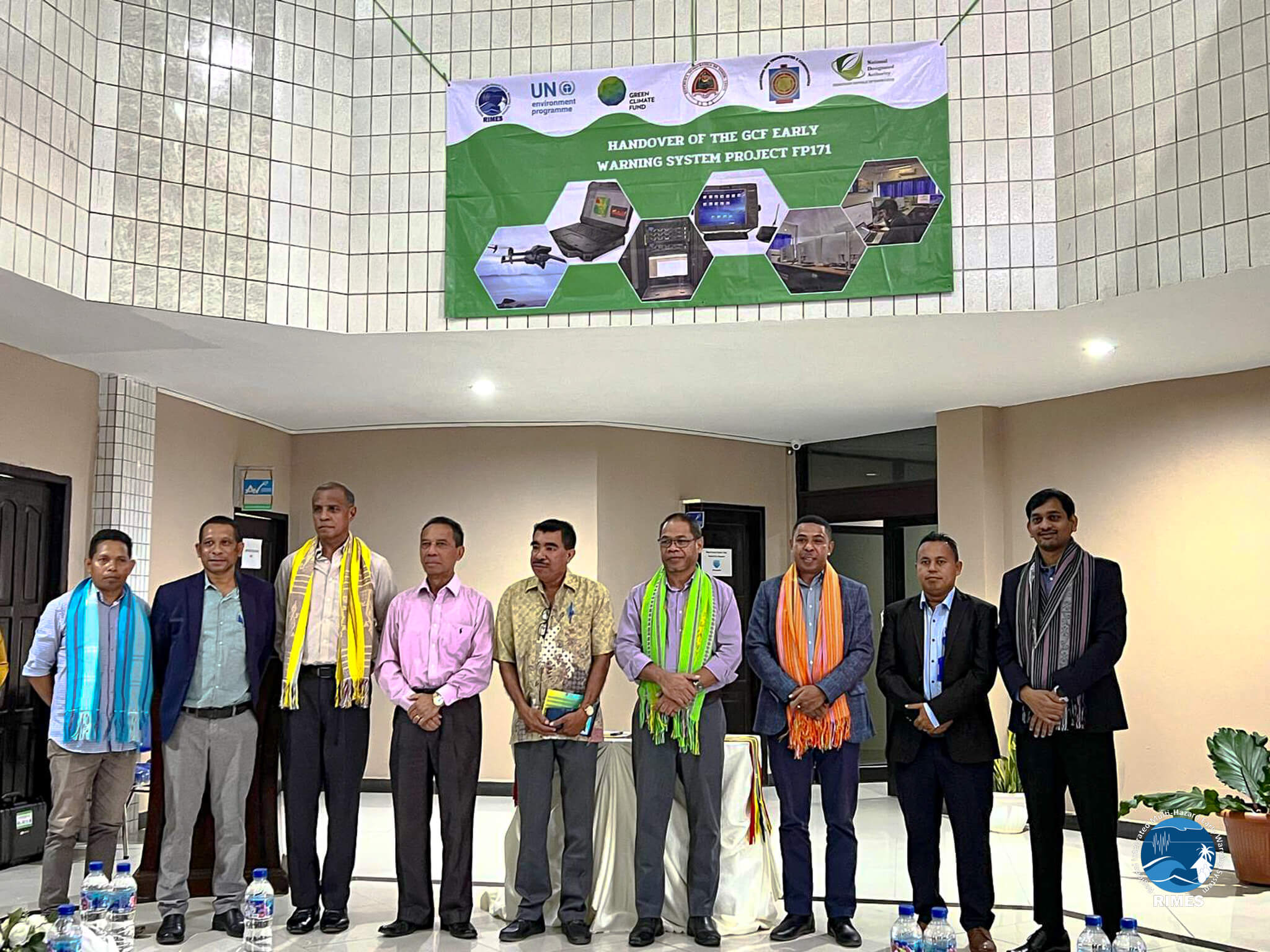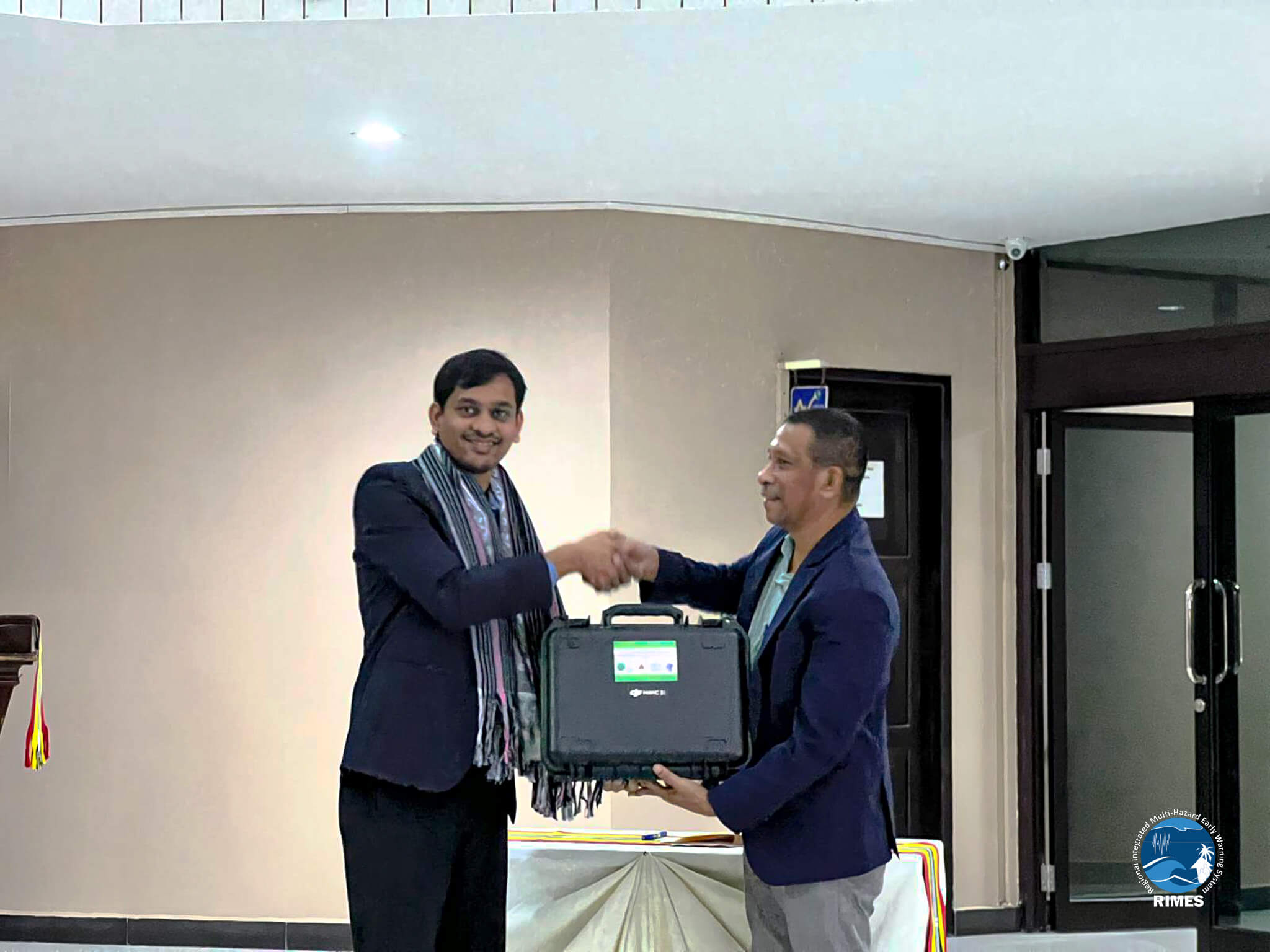RIMES hands over forecasting equipment to DNMG-Timor-Leste, bolstering climate resilience

15 May 2025 | Dili, Timor-Leste – In a significant step towards modernization and climate resilience, the Regional Integrated Multi-Hazard Early Warning System (RIMES) officially handed over vital forecasting equipment to Timor-Leste's National Directorate of Meteorology and Geophysics (DNMG). The ceremony marked a key milestone in the "Enhancing Early Warning System to Build Great Resilience to Hydrometeorological Hazard in Timor-Leste" project.
Supported by the Green Climate Fund (GCF) through the UN Environment Programme (UNEP), the project provided servers for observation, collection, analysis, storage, and computation of weather and climate data. The handover also included an upgraded National Forecasting Centre, enhancing capabilities for data analysis, visualization, and forecasting.
Terêncio Fernandes Moniz, Director of DNMG, emphasized the importance of this development, stating that the new equipment, including sensors and gateways, will provide accurate, timely data to support decision-making in critical sectors like agriculture, disaster risk reduction, and health. He highlighted that this project is the "first step in a broader initiative to strengthen the nation’s ability to monitor and respond to climate risks". Director Terêncio further remarked that these capabilities will "improve early warning systems, enhance public services, and build long-term climate resilience for Timor-Leste".
The UNEP Project Manager, Sr. Shobari Guterres Nunes, outlined several key advancements within the weather technology initiative in Timor-Leste. These include progress on the National Framework for Climate Services (NFCS), the development of a Meteorology Law Framework, and the creation of a Climate Financial Framework. Additionally, a Climate Data Strategy has been developed, and a Climate Sector Action and Communication Plan (CSACP) is being circulated. The project also encompasses the purchase of weather stations, low-cost stations, and automatic weather systems, with installations anticipated by September. Furthermore, a significant air quality monitoring program is underway, with 65 sensors being deployed this year and another 65 planned for the next, covering all municipalities. Nunes emphasized the importance of the technical partnership with RIMES to support the progress of these initiatives.
Meanwhile, in support of the project, Sr. Alves Gomes Martins, General Coordinator of MTA, acknowledged Timor-Leste's vulnerability to climate change and how the transfer of knowledge and technology through comprehensive training will ensure the project's sustainability and position DNMG as a "world-class institution". Mr. José da Costa, Chief of the Planning and Monitoring Advisor at the Ministry of Transport and Communications (MTC), stressed that the "digitalization of meteorological services is not just a technical upgrade but a vital step toward sustainable development and public safety". He highlighted the project's focus on training and knowledge transfer, noting that the development of Decision Support Systems will turn data into meaningful actions for key sectors.

Mr. Mitesh Sawant, Project Manager and Agriculture Specialist, led the symbolic delivery of equipment on behalf of RIMES. A tour of the Forecast Room followed the ceremonies, where attendees were shown the latest equipment and technology additions to DNMG’s operations.
The partnership of various stakeholders is critical in advancing Timor-Leste's early warning capabilities and resilience to hydrometeorological hazards. The collaborative effort is seen not just as a technological upgrade but as an investment in knowledge, security, and a sustainable future for the nation. #
---------
The 'Enhancing Early Warning Systems to build greater resilience to hydro-meteorological hazards in Timor-Leste' project, spearheaded by UNEP and funded by GCF, aims to establish robust climate information services encompassing oceans and a pioneering Multi-Hazard Early Warning System (MHEWS) tailored for diverse sectors and communities across Timor-Leste.